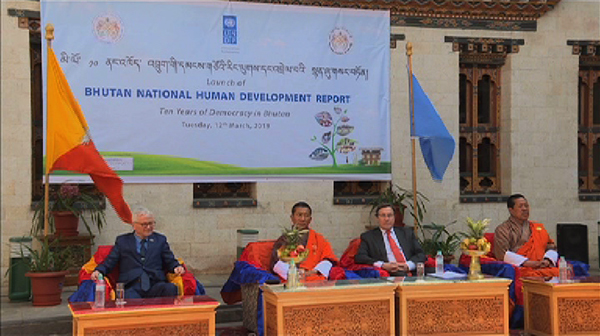 Bhutan’s growing democracy over the last ten years has helped advance development in the country, according to the National Human Development Report (NHDR) 2018.
Bhutan’s growing democracy over the last ten years has helped advance development in the country, according to the National Human Development Report (NHDR) 2018.
Prime Minister Dr Lotay Tshering and UNDP Administrator and UN Under-Secretary-General Achim Steiner released the report in Thimphu yesterday.
The ‘NHDR: Ten years of Democracy in Bhutan’ highlights the positive development results in the country and shows a decade of efforts to strengthen democratic governance in Bhutan through the concept of Gross National Happiness.
Also, the report serves as an advocacy tool to influence national policies and programmes in order to promote human development in the country.
“The national human development report is not meant to be simply a celebration of course. It is not to speak nice words to power. But it should provide a tool for a nation to reflect on its development and for the world to be able to reflect on its progress and development,” Achim Steiner, the UNDP Administrator, said.
The report also presents data, ‘A perspective survey on a decade of parliamentary democracy.2018’ conducted to find out what Bhutanese people have to say about a decade of democracy.
As per the survey, despite a period of adjustment, Bhutanese today are happy with the state of their democracy. It also revealed that Bhutanese perceive that they are engaged more than before in the national decision-making process with most respondents agreeing that democracy has made them more responsible.
With Bhutan’s Human Development Index Value seeing an over 20 per cent rise since 2005, the report says the democratically elected government had made significant efforts to enhance human development.
However, a substantial 36 per cent of respondents to the survey conducted for the report perceived that democracy so far has not been able to reduce the gap between rich and poor.
Other recent surveys have also shown that while measures of Gross National Happiness have improved overall at the national level, urban Bhutanese tend to be happier than rural residents and men more than women.
The report has made some 20 challenges and recommendations including the need to update Bhutan’s Vision 2020, a strong focus on decentralization, revising existing tax policy for revenue mobilization at the local level, waiving off university degree qualifications for politicians among others.
The report also states that Bhutanese have seen, once elected, the governments are acutely sensitive to criticism and people’s demands and sometimes shy away from tough decisions. The report says while some decisions may be difficult to make in the face of popular demand, they should be guided by a vision of national interest.
The NHDR is the first of its kind initiated by the UNDP Bhutan and the parliament of Bhutan.






